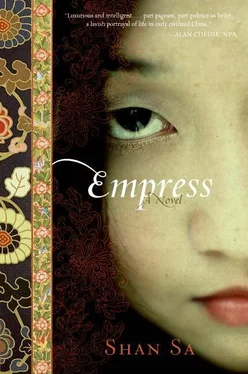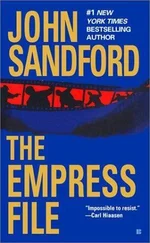Shan Sa - Empress
Здесь есть возможность читать онлайн «Shan Sa - Empress» весь текст электронной книги совершенно бесплатно (целиком полную версию без сокращений). В некоторых случаях можно слушать аудио, скачать через торрент в формате fb2 и присутствует краткое содержание. Жанр: Историческая проза, на английском языке. Описание произведения, (предисловие) а так же отзывы посетителей доступны на портале библиотеки ЛибКат.
- Название:Empress
- Автор:
- Жанр:
- Год:неизвестен
- ISBN:нет данных
- Рейтинг книги:5 / 5. Голосов: 1
-
Избранное:Добавить в избранное
- Отзывы:
-
Ваша оценка:
- 100
- 1
- 2
- 3
- 4
- 5
Empress: краткое содержание, описание и аннотация
Предлагаем к чтению аннотацию, описание, краткое содержание или предисловие (зависит от того, что написал сам автор книги «Empress»). Если вы не нашли необходимую информацию о книге — напишите в комментариях, мы постараемся отыскать её.
Empress — читать онлайн бесплатно полную книгу (весь текст) целиком
Ниже представлен текст книги, разбитый по страницам. Система сохранения места последней прочитанной страницы, позволяет с удобством читать онлайн бесплатно книгу «Empress», без необходимости каждый раз заново искать на чём Вы остановились. Поставьте закладку, и сможете в любой момент перейти на страницу, на которой закончили чтение.
Интервал:
Закладка:
An imperial decree was posted up in the four corners of the Empire: “Any individual who has no official State duties may now address Her Supreme Majesty freely by placing their written statements in the Urn of Truth. The eastern side of the urn is reserved for recommending competent officials and for comments on sound imperial decisions. The southern side is intended for censure of social and political events. The western side is for denouncing crimes and offences. The northern side will be used for astrological predictions and reports of premonitory dreams concerning the fate of the Empire.”
This first edict was followed by a second: “During their travels to the Sacred Capital, those bearing messages intended for the Supreme Empress will be given a daily payment and will be provided with bed and board by the regional authorities. Any imperial administrator committing the crime of questioning his guests, intercepting their letters, or impeding their journey to the Capital will be punished by death.”
It was not long before a third decree was sent out: “Any man, regardless of his origins, bearing useful advice or having suffered an injustice, shall be received by Her Supreme Majesty in person.”
My announcements put the Empire into turmoil. Convoys organized by provincial governments formed long uninterrupted streams of people along the country’s roads. The people queued up outside the Forbidden City to reach the Urn of Truth. Imperial bailiffs collected the letters at dusk and brought them to me at night. Banquets and concerts were temporarily suspended in my palace. I chose the best pupils from the women at the Inner Institute of Letters as my readers. Ornate chandeliers were extinguished, and only candles on short candlesticks were kept alight. The young women did not wear topknots or official court tunics and sat with their bare feet in silk slippers. They were virgins in flesh and in their judgments, and they were shocked by the vulgar turns of phrase. From time to time, Gentleness would lay down the work and call for wine and fruit. She would sit behind me and massage my tired temples. Somewhere in the depths of the room, a girl would play the zither, and another would accompany her with the clear notes of a bamboo flute. When they fell silent, the only sounds were the rustle of paper and the whisper of silk sleeves. Scribe of Loyalty would arrive late in the night, and, when he appeared, the young girls would flee in every direction like flocks of birds disappearing into the darkness.
A palace in the Outer City was prepared to receive the people. At certain times throughout the afternoon, I would sit on my throne surrounded by gauze curtains, watching all of China file past.
A peasant came to complain about the taxes on his land. A butcher denounced a dignitary who had taken his wife. A fisherman suggested that a canal should be built in his region. An impoverished scholar in love with a courtesan begged me to free his beloved. A madman talked about the end of the world. A woman from my region came to thank me for encouraging widows to remarry. Another brought me a basket of eggs.
Countless hundreds of them were terrified by the majestic palaces and the imposing military parades around me. Intoxicated by their fears and their veneration, they could not utter a word and carried on striking their foreheads on the ground until they were led away by eunuchs.
I delighted in hearing all the regional accents; I was touched by people’s modest dreams and humble longings; and I suffered for those in despair-the starving, the old, and the orphans.
Learned, self-taught men without diplomas were given official positions. Strong and supple young men joined the army. Criminals saw their punishments reduced. To every creature who called on my help, I tried to grant clemency, justice, and happiness.
I was consumed by the vastness of China. The silhouettes on the far side of the curtain became confusing and overran me like a fever. All these people-thin, fat, tall, short, deformed, and ill-grasping the hem of my gowns pressed against my retina and invaded my dreams to ask for my goodness once again. The more I gave, the bigger the crowd of supplicants grew. All these miseries that were being revealed to me were just tiny portions of an infinite suffering.
I was proud, and I was disappointed; I was happy, and I felt guilty. Through these hundreds of lives, I was trying to find an answer to all the sorrows and pains of this world, but the solution melted away like water on sand. The root of these evils was still impenetrable.
During one of these sessions, the Council of Great Ministers brought me a petition in which my imperial officials begged me to suspend the public audiences in the interests of my own health.
“Supreme Majesty,” said the Great Chancellor, prostrating himself, “no other sovereign has deigned to receive the people. And yet the Scholarly King of Zhou, the Emperor Lordly Forebear of the Han dynasty, the Scholarly Emperor of the Wei dynasty, and the Emperor Eternal Ancestor were all able to fulfill their celestial duties successfully and gloriously. A good sovereign knows the suffering and the joy of the people, but also knows how to delegate concerns to servants. That is why the ancient Zhou dynasty created the position of inspector and disguised these men as beggars before sending them out to every province. Her Supreme Majesty’s health is the Chinese people’s most precious resource. If she were exhausted, the entire world would be deprived of every joy. She must save her strength and her energy for the most important decisions.”
“When I introduced the Urn of Truth,” I replied, “and opened the Forbidden City to the people, this act was not intended to mock previous emperors, but to warn future sovereigns. Shut away in his palace and surrounded by courtiers dressed in brocade, the Master of the Empire knows nothing of hunger, poverty, and the trials of life. If he is the motionless center of the hub, then let the world come to him! The public audiences over the last few months have shown me the truth: As I treat each successive case, my power seems to diminish. Every act of kindness is a drop of water added to a constantly moving river. By granting my favors to some, I have withheld them from others who dared ask me for nothing. I must not take the place of the gods by handing out the fates of men. A sovereign’s power is an illusion and a promise. Only Buddha’s compassion can turn suffering into perpetual joy. I now accept your request, and I shall suspend the public audiences. But the Urn of Truth will continue to receive the complaints of the people. Politics can heal, but it cannot cure. Only a spiritual force can overcome ailing flesh and aching souls. He who is in the light forgets hunger and thirst. Let us pray that our empire will know religious bliss and be lifted up to the heavens.”
TEN
I, the wandering child, I, the shaven-headed nun, I, the concubine who preferred the power of separation to the weakness of attachment, I, the Empress who was both in and out of life here and elsewhere-I noticed with stupefaction that a miracle had come to pass: I had laid down roots at the city of Luoyang.
Since my husband had joined the heavens, I had never returned to Long Peace. The seething metropolis of a million inhabitants had swept aside all the illusions of a provincial Talented One. I did not miss its markets and rows of little shops, its avenues of jostling horses and pedestrians. That town had forged me and perverted me. Away from it, I could at last forgive its feverish debauchery, its easy wealth; I no longer criticized its gleeful dissipation, its titillating exuberance. I had freed myself once and for all from a Forbidden City built by the emperors of Tang, haunted by the ghosts of murdered princes and poisoned concubines. Long Peace, which had robbed me of my youth, would be punished by my absence.
Читать дальшеИнтервал:
Закладка:
Похожие книги на «Empress»
Представляем Вашему вниманию похожие книги на «Empress» списком для выбора. Мы отобрали схожую по названию и смыслу литературу в надежде предоставить читателям больше вариантов отыскать новые, интересные, ещё непрочитанные произведения.
Обсуждение, отзывы о книге «Empress» и просто собственные мнения читателей. Оставьте ваши комментарии, напишите, что Вы думаете о произведении, его смысле или главных героях. Укажите что конкретно понравилось, а что нет, и почему Вы так считаете.





